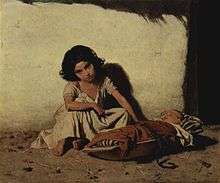Ursitory

The Ursitory ("white women" also known as Ursitori, Oursitori, Ursitele, Urbitele, Urditele, Osatorele, Ursoi, Ursoni or Urmen, Uremi, Ourmes) are a group of three fairies or female spirits of fate in Romani folklore. Two of them are good spirits, while one tries to harm people. Their queen is Matuya, who makes use of gigantic birds called the charana.[1][2][3][4]
These fairies became more widely known by the novel "The Ursitory" written by Matéo Maximoff in 1938 and first published in 1946.[5] According to him, the Ursitory are thre angels of fate, the good angel, the bad angel and the impartial angel of reason, who decide about the fate of the baby on the third day after its birth. On that day, the mother places three pieces of bread and three glasses of wine in a circle around the child for the ursitory. Then she whispers the child's real name, which is according to some traditions kept secret against the father and the children themselves until they become adults, because the name represents power.[6]
References
- ↑ Micha F. Lindemans: Urmen. Encyclopedia Mythica article created on 3 March 1997, last modified on 19 March 1997. Retrieved on 3 July 2016.
- ↑ Hermann Berger: Mythologie der Zigeuner. Originally published in: Hans Wilhelm Haussig (editor): Götter und Mythen des indischen Subkontinents. Stuttgart, 1984, p. 773–824. On-line version p. 44, downloaded on 3 July 2016. (German)
- ↑ v: Encyclopedia of Fairies in World Folklore and Mythology. McFarland, 4. September 2013, p. 335.
- ↑ Spirits, magic and witchcraft. Published by Gitans' Culture on 23 October 2012 in Gypsies' culture, Gypsies' world, magic and witchcraft, retrieved on 3 July 2016.
- ↑ Matéo Maximoff: The Ursitory. Chapman & Hall, 1949.
- ↑ After the devouring. The Independent, 11 May 2003. Retrieved on 3 July 2016.